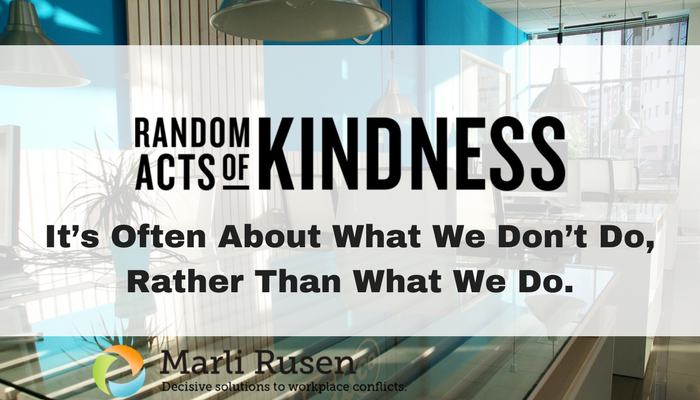Resources > Blog > Random Acts of Kindness Week: It’s Often About What We Don’t Do, Rather Than What We Do

In thinking about Random Acts of Kindness week, I realized that we often talk about ways in which we can be kinder to others through our actions – what we do for others and what we give to others.
However, it is equally important to consider what we need to stop doing to others in the name of kindness.
Here are some simple actions we can stop taking – randomly over this week and routinely as we move forward – in order to build healthier and kinder workplaces and communities:
- Stop gossiping about others – in person or through the internet. I notice – in my work and community – how easy it is for people to become intrigued and entertained by others’ stress and struggles. At a time when many need support, they are instead faced with rumours, isolation and criticism rooted in speculation, half-truths and biased information. This negativity – which fuels their personal pain – rapidly multiplies through casual conversations and computer courage. If we can’t help others through their trying times, then let’s try not to hurt them.
- Stop trying to resolve conflicts with one person by talking about them to others. This is an epidemic in our workplaces and communities. We spend hours and days talking about others rather than to them (and then somehow expect our situations to improve). If we have an issue with someone, we need to let them know and then give them an opportunity to help make things better. Talking about them to others will only make things worse.
- Stop assuming others are acting with malice. Every week, I encounter situations in which individuals have hurt each other, often by what they have said or the way in which they have said it. Most of the time, those “doing the hurting” have no idea they have done so. Perhaps they were distracted. Or tired. Or sloppy in their approach. Only on the rarest of occasions do others purposely act out against us. Remember this before you assume the worst and counter-attack in response.
- Stop using “just a” to describe yourself or others. I commonly hear individuals describe others as “just an assistant” or “just a part-timer” or “just a ________”. It shows up in every workplace, industry and profession. When we describe someone like this, we devalue them – and their role – in our communities and organizations. In doing so, we suggest that they deserve to be treated differently – “worse than” those around them. This is simply not the case. If we truly want to change our behavior, we first have to change our words. Stopping the “just a” reference would be a great first step.
- Stop using your face to show how you feel. Often, we react to others’ opinions or comments by rolling our eyes, smirking with sarcasm or shaking our heads. In doing so, we let others know we aren’t happy with them but don’t explain why. This adds confusion to an already unhealthy situation. Let’s translate our eye-rolls, smirks and head-shakes into respectful dialogue about what we are upset about and then watch as we build relationships rather than resentment.
- None of these changes cost us time or money. Each of them will go far in building kinder communities and stronger connections with those around us.
In honor of Random Acts of Kindness Week – try not acting – in the name of kindness – and see what happens.
